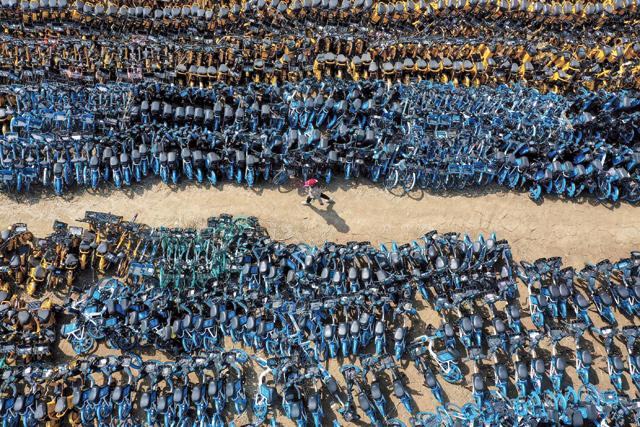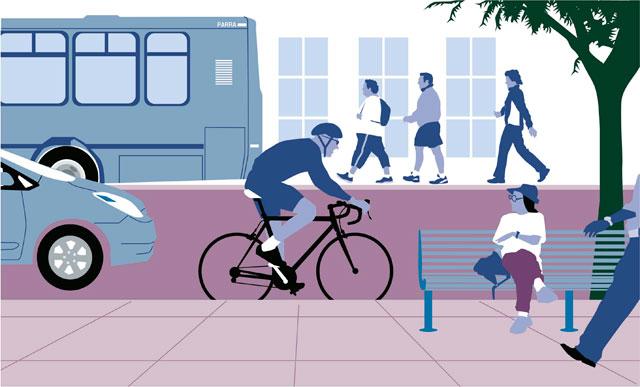You are here
Need a ball or umbrella? In China there’s a sharing app for that
By AFP - Jul 08,2017 - Last updated at Jul 08,2017

Photo courtesy of knowledge.ckgsb.edu.cn
SHANGHAI — Basketballs, electric scooters and rainbow-coloured umbrellas — nothing seems out of bounds in China’s booming “sharing economy”.
Where once Chinese consumers would look to shell out on items such as luxury handbags or cars, now they can rent them for short periods taking advantage of the explosion of mobile payment technology.
As ever with China, the numbers are mind-boggling: the shared economy more than doubled to 3.45 trillion yuan ($505 billion) last year from a year earlier, according to official figures which projected average annual growth of 40 per cent in the years ahead.
But experts warn that China, which has rapidly become a world leader in the concept, is oversharing, and some start-ups are going bust.
The fiercely competitive bike-sharing craze in China’s major cities claimed what was widely reported as its first victim in June when Wukong Bike reached the end of the road with 90 per cent of its bikes missing and presumed stolen.
The government has supported the sharing industry as a new growth driver as the overall economy slows, but there are signs Beijing is becoming wary and on Monday it asked local governments to come up with new industry regulations.
In Shanghai, where bicycles of all colours threaten to take over the streets, Claire Victoria Pan said she uses a gamut of sharing services for bikes, cars, Airbnb and co-working spaces.
“These sharing tools make life very convenient,” said Pan, from Hong Kong but living in Shanghai, where she founded a wine-trading company.
“There is over-sharing, but it is just temporary. When a new thing appears it will expand quickly so that there is excess supply.
“But after a period of time people find that demand is limited, then the supply will naturally reduce.”
Disappearing bikes
Backed by a torrent of venture capital, the boom has spawned some novel ideas, including from an entrepreneur in eastern China’s Zhejiang province offering basketballs for hire to save people having to carry them to games.
Users can unlock a court-side locker by scanning a code with their smartphone and take the balls for 1.5 yuan (20 US cents) for 30 minutes.
A camera films the transaction to discourage them running off with the balls.
Spare rooms, washing machines, umbrellas and mobile phone charging are all up for rent as China becomes the home of the sharing economy.
Smartphone apps such as Alipay and WeChat have enabled the boom by allowing customers to buy products or transfer money by scanning QR codes.
Bike-sharing, in which users can pick up bicycles on the street and leave them anywhere when finished, has been a standout success since being introduced in the last two years and latest official figures say there are now 10 million such bikes ploughing the streets of China.
But with complaints soaring about bikes parked haphazardly and clogging up pavements, a backlash has begun.
In an attempt to get a grip on the runaway industry, authorities in Shanghai and Tianjin will impose regulations from October 1 mandating a bicycle service life of three years and requiring companies to hire at least one maintenance employee for every 200 bicycles, state news agency Xinhua said.
Wukong Bike, in the southwestern megalopolis of Chongqing, folded within just a few months and this week Beijing-based 3Vbike packed it in after most of its bikes also went AWOL.
‘Sharing bubble’
These won’t be the last casualties, said Christopher Balding, associate professor at Peking University HSBC Business School in the southern city of Shenzhen.
“These sharing companies do provide very real benefits and in Shenzhen people are using these bikes all the time,” he said.
Balding added Chinese were attracted to such services because they tend to be very “price-sensitive”, and cited a bike-sharing firm that allows users to recharge their phones while cycling.
But he warned: “Investors are pouring enormous sums into this, there are too many companies and there does need to be industry consolidation.
“I’ve joked with different people about the next crazy new sharing start-up app that we’re going to generate.
There is a fad and everyone’s trying to think of what’s the next sharing app so absolutely there’s a bubble in sharing companies.”
William Chou at Deloitte China said it had less to do with sharing and more about rental.
“For example, all of the bike sharing in China uses newly manufactured bikes, not bikes from people who already own it,” said Chou, leader of Technology, Media & Telecommunications.
“Ordinary people cannot profit from owning a bike, only the company that offers it makes money.”
Chou said that phone-battery chargers in shopping malls, restaurants and convenience stores were the next “big thing”, but also cited a shared electric scooter in Hangzhou, a city near Shanghai.
“Chinese consumers are getting used to the concept of sharing, in previous years they would rather own their stuff,” Chou said.
“But as more people embrace the concept of sharing the market will continue to expand.”
Related Articles
BEIJING — Handlebars tight in snaking rows of colour, thousands of abandoned bicycles line an open field outside the city of Shenyang, relic
SHANGHAI — Unlock them with an app, drop them off anywhere, and nip past lanes of stationary car traffic: the humble bicycle is seeing a rev
TEHRAN — One sunny day, Tehran’s mayor and foreign diplomats rode bicycles through the Iranian capital to promote cycling — no mean feat in
















